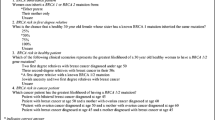Abstract
Background
The Georgia Breast Cancer Genomic Health Consortium is a partnership created with funding from the Centers for Disease Control and Prevention (CDC) to the Georgia Department of Public Health to reduce cancer disparities among high-risk minority women. The project addresses young women at increased risk for hereditary breast and ovarian cancer (HBOC) syndrome through outreach efforts.
Methods
The consortium provides education and collects surveillance data using the breast cancer genetics referral screening tool (B-RST) available at www.BreastCancerGeneScreen.org. The HBOC educational protocol was presented to 73 staff in 6 public health centers. Staff used the tool during the collection of medical history. Further family history assessments and testing for mutations in the BRCA1/2 genes were facilitated if appropriate.
Results
Data was collected from November 2012 through December 2013, including 2,159 screened women. The majority of patients identified as black/African American and were 18–49 years old. Also, 6.0 % (n = 130) had positive screens, and 60.9 % (n = 67) of the 110 patients who agreed to be contacted provided a detailed family history. A total of 47 patients (42.7 %) met National Comprehensive Cancer Network guidelines when family history was clarified. Fourteen (12.7 %) underwent genetic testing; 1 patient was positive for a BRCA2 mutation, and 1 patient was found to carry a variant of uncertain significance.
Conclusions
The introduction of genomics practice within public health departments has provided access to comprehensive cancer care for uninsured individuals. The successful implementation of the B-RST into public health centers demonstrates the opportunity for integration of HBOC screening into primary care practices.

Similar content being viewed by others
References
U.S. Preventive Services Task Force. Genetic risk assessment and BRCA mutation testing for breast and ovarian cancer susceptibility: recommendation statement. Ann Intern Med. 2005;143:355–61.
Berry DA, Iversen ES Jr, Gudbjartsson DR, Hiller EH, Garber JE, Peshkin BN, et al. BRACPRO validation, sensitivity of genetic testing of BRCA1/BRCA2, and prevalence of other breast cancer susceptibility genes. J Clin Oncol. 2002;20:2701–12.
Tyrer J, Duffy SW, Cuzick J. A breast cancer prediction model incorporating familial and personal risk factors. Stat Med. 2004;23:1111–30.
Antoniou AC, Pharoah PP, Smith P, Easton DF. The BOADICEA model of genetic susceptibility to breast and ovarian cancer. Br J Cancer. 2004;91:1580–90.
Teller P, Hoskins KF, Zwaagstra A, Stanislaw C, Iyengar R, Green VL, et al. Validation of the Pedigree Assessment Tool (PAT) in families with BRCA1 and BRCA2 mutations. Ann Surg Oncol. 2010;17:240–6.
Moyer VA on behalf of the U.S. Preventive Services Task Force. Risk assessment, genetic counseling, and genetic testing for BRCA-related cancer in women: U.S. Preventive Services Task Force recommendation statement. Ann Intern Med. 2014;160:271–81.
Bellcross CA, Lemke AA, Pape LS, Tess AL, Meisner LT. Evaluation of a breast/ovarian cancer genetics referral screening tool in a mammography population. Genet Med. 2009;11:783–9.
Bellcross CA. Further development and evaluation of a breast/ovarian cancer genetics referral screening tool. Genet Med. 2010;12:240.
Thompson HS, Sussner K, Schwartz MD, Edwards T, Forman A, Jandorf L, et al. Receipt of genetic counseling recommendations among black women at high risk for BRCA mutations. Genet Test Mol Biomarkers. 2012;16:1257–62.
Sheppard VB, Mays D, LaVeist T, Tercyak KP. Medical mistrust influences black women’s level of engagement in BRCA1/2 genetic counseling and testing. J Natl Med Assoc. 2013;105:17–22.
Thompson HS, Valdimarsdottir HB, Duteau-Buck C, Guevarra J, Bovbjerg DH, Richmond-Avellaneda C, et al. Psychosocial predictors of BRCA counseling and testing decisions among urban African-American women. Cancer Epidem Biomarkers. 2002;11:1579–85.
Armstrong K, Micco E, Carney A, Stopfer J, Putt M. Racial differences in the use of BRCA1/2 testing among women with a family history of breast or ovarian cancer. JAMA. 2005;293:1729–36.
Centers for Disease Control and Prevention. CDC awards programmatic funding to support breast cancer genomics. http://www.cdc.gov/cancer/breast/what_cdc_is_doing/genomics_foa.htm (2013). Accessed 17 March 2014.
Acknowledgment
The authors are in appreciation of a funding opportunity award in the form of a Cooperative Agreement from the Centers for Disease Control and Prevention to the Georgia Department of Public Health, administered by the Georgia Center for Oncology Research and Education in partnership with Emory University, Morehouse School of Medicine, and Georgia State University. The authors would also like to acknowledge the staff at the Department of Public Health, including those members at the individual public health centers that are currently administering the initial screening tool. Most importantly, we acknowledge, the clients who agree to screening, especially those who agree to be contacted further and proceed with testing. Finally, we acknowledge the Wilbur and Hilda Glenn Family Foundation and Winship Cancer Institute of Emory University’s Glenn Family Breast Center for providing pilot funding that led to Georgia’s successful CDC grant award.
Disclosure
Alice Kerber: Pfizer Inc., speakers bureau.
Author information
Authors and Affiliations
Corresponding author
Rights and permissions
About this article
Cite this article
Brannon Traxler, L., Martin, M.L., Kerber, A.S. et al. Implementing a Screening Tool for Identifying Patients at Risk for Hereditary Breast and Ovarian Cancer: A Statewide Initiative. Ann Surg Oncol 21, 3342–3347 (2014). https://doi.org/10.1245/s10434-014-3921-1
Received:
Published:
Issue Date:
DOI: https://doi.org/10.1245/s10434-014-3921-1




